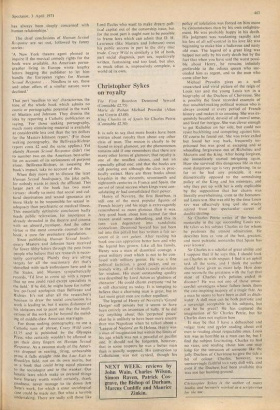David Hare on a layman's guide •
Understanding Human Sexual Inadequacy is the layman's guide to another volume, Hu- man Sexual Inadequacy by the famous Wil- liam H. Masters and Virginia E. Johnson— itself a follow-up to Human Sexual Response, an altogether happier subject charted historic- ally in 1966, and a mindless source of mirth ever since. So Fred Belliveau and Lin Richter climb solemnly on to the Ernest Jones plinth to popularise the works of the forerunners. This they do with an appropriate level of humane seriousness which is maintained for 242 pages without cracking an inch. In the second chapter, headed 'What Are They Like?' they introduce their heroes:
'Masters has a commanding face with pene- trating blue-green eyes his most dominant feature. Masters looks serious and business- like, and extremely energetic, yet also kindly. Only after one gets to know him does his humour become apparent.'
The blatantly. salacious nudge is never pursued. Instead we go on to learn:
'Mrs Johnson is a pretty, feminine woman, now in her mid-forties, who radiates an easy manner that puts people at ease quickly. She has always been deeply concerned with human relationships.'
The chief conclusions of Human Sexual Response are set out, followed by funny stories: 'A New York theatre agent phoned to inquire if the musical comedy rights for the book were available. An American porno- grapher living in Europe wrote lengthy letters begging the publisher to •let him handle the European rights for Human Sexual Response . . . Needless to say, these and other offers of a similar nature were declined.'
That pert 'needless to say' characterises the tone of the whole book which admits no comic or pornographic potential in the work of Masters and Johnson. They dismiss the idea by reporting a Catholic publication as saying, 'For those seeking pornography, much more stimulating material is available at considerable less cost than the ten dollars for the Masters-Johnson report.' (For those seeking pornography, the Belliveau-Richter report costs £2 and the same applies.) Yet plainly Human Sexual Response didn't rise to number two on the American best-seller list on account of its seriousness of purpose alone. Belliveau-Richter, in assessing the book's impact, take no account of this.
When they move on to discuss the later Human Sexual Inadequacy, the joke palls, for nobody wants to mock the afflicted. This larger part of the book has two main virtues: chiefly to insist that social and cul- tural deprivation and sexual ignorance are more likely to be responsible for sexual in- adequacy than psychiatric or medical illness. This essentially optimistic conclusion badly needs public reiteration, for impotence is already shrouded in the theatre and cinema with an absurd „mystique. And the other virtue is the most concrete counsel in the book, a cure for premature ejaculation.
Since publishing Human Sexual Inade- quacy Masters and Johnson have received far fewer filthyletters through the post from People who believe that sex research is neces- sarily corrupting. Plainly they are sitting targets for all the reactionary dirt that's shovelled with such enthusiasm here and in the States, and Masters sympathetically records. 'I'd love to come up with a report that no one could read except specialists in the field.' If he did, he might hone for rather less po-faced apologists than Belliveau and Richter. It's not after all the researcher's business to draw the social conclusions his work is leading to, but it seems dishonest of his idolators not to point out that the impli- cations of the work go far beyond the mend- ing of middle-class American marriages.
For those seeking pornography, to use a Catholic turn of phrase, Crazy Wild costs €1.75 and is published by. the Olympia Press, who certainly wouldn't be allowed to get their dirty fingers on Human Sexual Response. As a raucous study of the Ameri- can dropout in searing, ,tiring, unbearable Prose it falls straight into the Last Exit to Brooklyn field, not on its own merits, but as a book that could bring equal pleasure to the sociologist and to the wanker. Our lunatic laws which make us pretend things have literary worth would certainly, thank goodnes5. never manage to tie down Jett Sage's work, for which a stout sociological case could be made out. But what a terrible undertaking. There are sadly still those like Lord Eccles who want to make dreary poli- tical capital out of the censorship issue, but for the most part it ought now to be possible to frame laws which can admit that D. H. Lawrence (like Masters and Johnson) owes his public success in part to the dirty mac trade. Crazy Wild is similarly a bit of both, part social diagnosis, part sex, repetitively written. fantasising and too loud, but also, as muck often is, impressively complete, a world of its own.



































 Previous page
Previous page